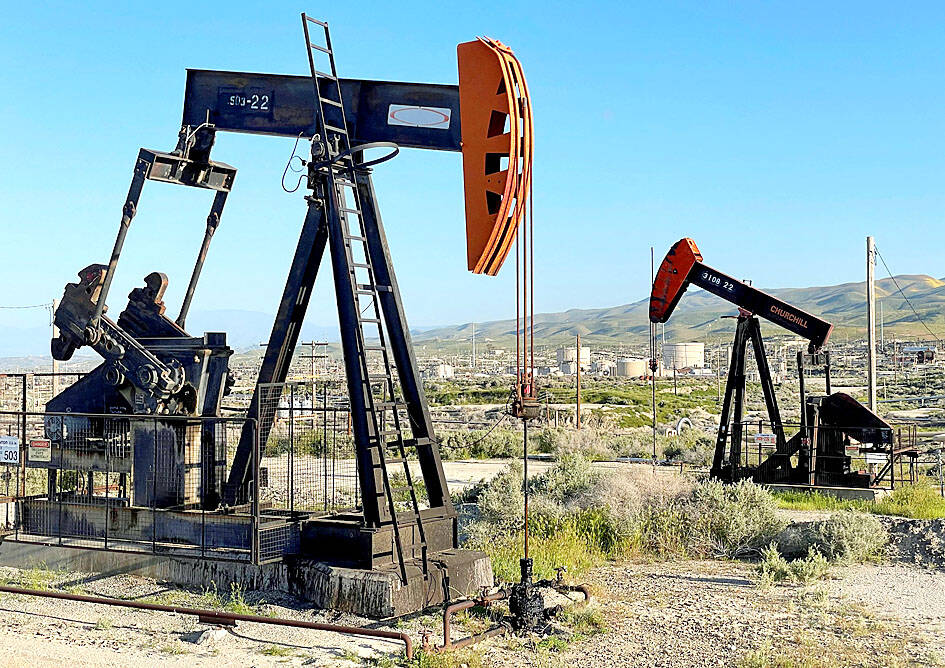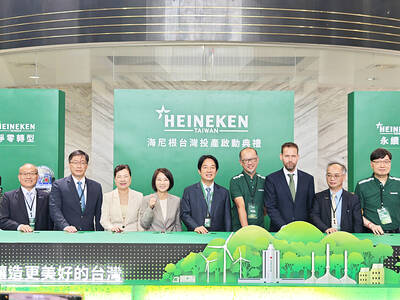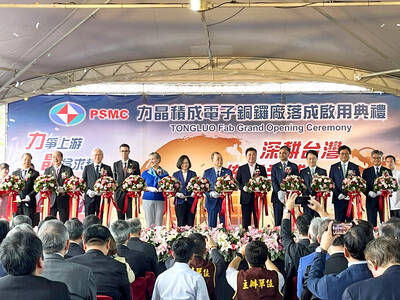California sued major oil companies including Exxon Mobil Corp and Shell PLC, saying they deceived the public for decades while creating or contributing to local climate catastrophes.
The civil case, filed in superior court in San Francisco, also targets BP PLC, ConocoPhillips, Chevron Corp and the American Petroleum Institute, according to a spokesperson at the attorney general’s office.
The lawsuit requests the creation of an abatement fund to finance climate mitigation efforts, an injunction to protect California’s natural resources, damages and penalties.

Photo: Reuters
The action includes some of the strongest allegations against oil giants as the state deals with increasingly destructive storms and weather events, from ravaging wildfires to “atmospheric rivers.” California has spent, and will continue to dish out, billions of dollars to recover from climate catastrophes, the complaint said.
“From extreme heat to drought and water shortages, the climate crisis they have caused is undeniable. It is time they pay to abate the harm they have caused,” Attorney General Rob Bonta said.
The increasingly heavy financial burden of climate disasters has prompted major US insurance companies to limit their coverage in California. State Farm General Insurance Co no longer accepts new applications for property and casualty coverage in the state.
The lawsuit comes ahead of New York City’s Climate Week, which runs alongside the UN General Assembly.
Shell said litigation was not the appropriate vehicle for addressing climate change.
“We do not believe the courtroom is the right venue to address climate change, but that smart policy from government and action from all sectors is the appropriate way to reach solutions and drive progress,” Shell said in a statement.
Chevron criticized the California government.
“Its local courts have no constructive or constitutionally permissible role in crafting global energy policy,” a Chevron spokesperson said. The company said it has been a “leading promoter of oil and gas development.”
American Petroleum Institute (API), for its part, defended the industry, citing environmental and green initiatives.
“The record of the past two decades demonstrates that the industry has achieved its goal of providing affordable, reliable American energy to US consumers while substantially reducing emissions and our environmental footprint,” API senior vice president and general counsel Ryan Meyers said in a statement.
Food and Water Watch, a DC-based advocacy group, commended California state leaders for taking this step, but said it would take years for residents to feel the impact of the payouts requested in the lawsuit. Instead, they called on California Governor Gavin Newsom to stop new fossil fuel permits, reject hydrogen and carbon capture and quickly move off fossil fuels.

purpose: Tesla’s CEO sought to meet senior Chinese officials to discuss the rollout of its ‘full self-driving’ software in China and approval to transfer data they had collected Tesla Inc CEO Elon Musk arrived in Beijing yesterday on an unannounced visit, where he is expected to meet senior officials to discuss the rollout of "full self-driving" (FSD) software and permission to transfer data overseas, according to a person with knowledge of the matter. Chinese state media reported that he met Premier Li Qiang (李強) in Beijing, during which Li told Musk that Tesla's development in China could be regarded as a successful example of US-China economic and trade cooperation. Musk confirmed his meeting with the premier yesterday with a post on social media platform X. "Honored to meet with Premier Li

Dutch brewing company Heineken NV on Friday announced an investment of NT$13.5 billion (US$414.62 million) over the next five years in Taiwan. The first multinational brewing company to operate in Taiwan, Heineken made the statement at a ceremony held at its brewery in Pingtung County. It also outlined its efforts to make the brewery “net zero” by 2030. Heineken has been in the Taiwanese market for 20 years, Heineken Taiwan managing director Jeff Wu (吳建甫) said. With strong support from local consumers, the Dutch brewery decided to transition from sales to manufacturing in the country, Wu said. Heineken assumed majority ownership and management rights

ARTIFICIAL INTELLIGENCE: The chipmaker last month raised its capital spending by 28 percent for this year to NT$32 billion from a previous estimate of NT$25 billion Contract chipmaker Powerchip Semiconductor Manufacturing Corp (力積電子) yesterday launched a new 12-inch fab, tapping into advanced chip-on-wafer-on-substrate (CoWoS) packaging technology to support rising demand for artificial intelligence (AI) devices. Powerchip is to offer interposers, one of three parts in CoWoS packaging technology, with shipments scheduled for the second half of this year, Powerchip chairman Frank Huang (黃崇仁) told reporters on the sidelines of a fab inauguration ceremony in the Tongluo Science Park (銅鑼科學園區) in Miaoli County yesterday. “We are working with customers to supply CoWoS-related business, utilizing part of this new fab’s capacity,” Huang said, adding that Powerchip intended to bridge

Microsoft Corp yesterday said that it would create Thailand’s first data center region to boost cloud and artificial intelligence (AI) infrastructure, promising AI training to more than 100,000 people to develop tech. Bangkok is a key economic player in Southeast Asia, but it has lagged behind Indonesia and Singapore when it comes to the tech industry. Thailand has an “incredible opportunity to build a digital-first, AI-powered future,” Microsoft chairman and chief executive officer Satya Nadella said at an event in Bangkok. Data center regions are physical locations that store computing infrastructure, allowing secure and reliable access to cloud platforms. The global embrace of AI